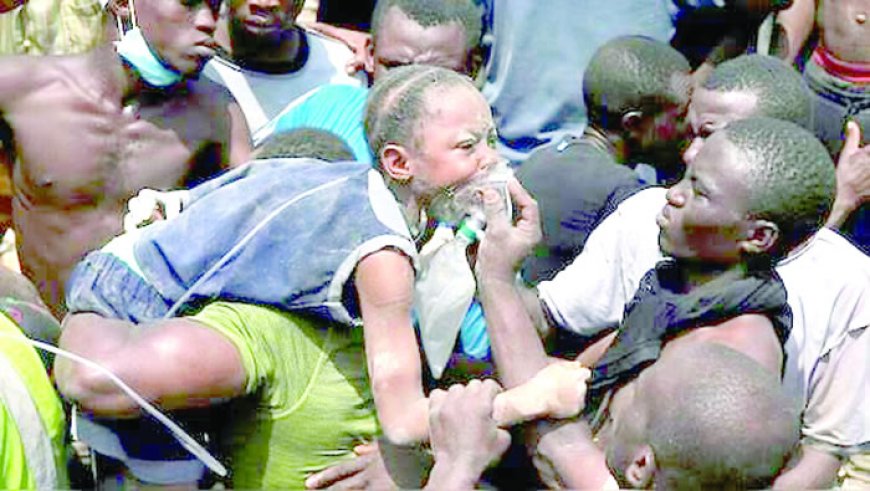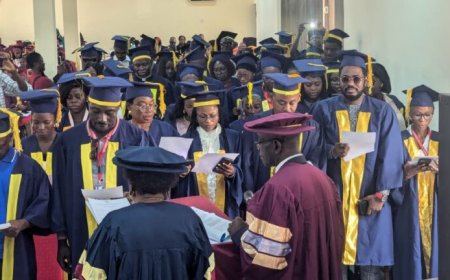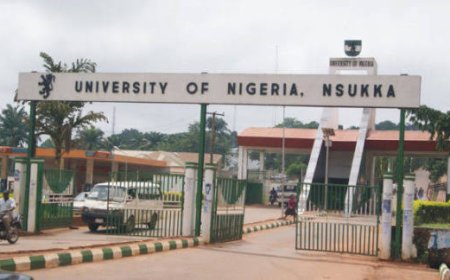Harvest of human chickens for Xmas
The unnamed woman had just given birth to a baby five days before. Her body was still wet as Yoruba say of mothers who newly underwent the pangs of labour and delivery. Pains must still be ricocheting round her navel.

By Festus Adebayo, PhD
The unnamed woman had just given birth to a baby five days before. Her body was still wet as Yoruba say of mothers who newly underwent the pangs of labour and delivery. Pains must still be ricocheting round her navel. Ex-Queen of the Ooni of Ife, Prophetess Naomi Silekunola, and an Ibadan-based broadcaster, Oriyomi Hamzat, had promised her and her baby free food. This was done in a blast of publicity inviting her kid and 4999 other children to a funfair. The event was slated for Islamic High School, Bashorun, a suburb of Ibadan. The organizers said it would be an unprecedented funfair of freebies never given before. Hamzat’s Agidigbo Radio, based in the capital of Oyo State, is undoubtedly the darling of the common people. It is top of the radar, traffic-wise. Hamzat popularized the medium as one that tends to the needs of the common people and discusses issues agitating their minds.
Scholars have posited that everyday matters woven round the existence of the ordinary man are sex, cheap sex, poverty, food, crime, alcohol, divorce, gambling and sexual violence. Matters that are queer, uncommon and mind-boggling, which cannot be divorced from those everyday issues, are given pride of place on Agidigbo radio. Listeners gravitate towards the radio in their multiple of thousands. It is on Agidigbo you would hear stories of a less than 20-year old lady whose pregnancy is being contested by two artisan boys. Salacious details that evoke laughter and tears ooze out of the radio. Hamzat himself, renowned for the phrase, “E bá wa gbé’nu sí mic” – kindly draw closer to the microphone – popularized that phrase. It acquired a life of its own, becoming synonymous with someone being under public scrutiny. Or one enmeshed in petty misdemeanor. It is no wonder that in the Nigerian Broadcasting Service (NBS) rating, Agidigbo is No 1 in Oyo State. So, it should be common sense that if you advertize a funfair that would give N5000 – about $3 USD – to hewers of woods and drawers of water, in this T-Pain economy of Bola Tinubu, you would get more than you bargained for. Senegalese author, Ousmane Sembène, whose 1960-written book, entitled God’s Bits of Woods, discusses the fate of these underprivileged people in details.
The unnamed woman heard or was told about the alliance by Queen Naomi and Hamzat to provide succor for her new born baby. Not minding her “wet body”, she strapped her fragile new born baby to her back and headed for Bashorun. By 5am, the venue was already bursting at its seams with persons. Did some wicked people land Queen Naomi and Hamzat in trouble spiritually? This is a question being asked in some quarters.
If Hamzat and Olori Silekunola emerge from their current travails unscathed, they may learn to seek our Mothers’s faces in subsequent ventures. It is said that such gathering of a large crowd involving women and children are sacred and must be looked at from the lens of teleology. In his “Òṣòròmọ̀nìgà: Representations of witchcraft in Yoruba films,” (Nordic Journal of African Studies – Vol 30 No 2, 2021) Olusegun Soetan of the African Studies Department, Pennsylvania State University, venerates the place and value of witchcraftcy which he called àjẹ́ism. Òṣòròmọ̀nìgà, said the scholar, is one of the many cognomens of witches in Ifá divination systems and praise poetry. According to him, “among the many supernatural phenomena in Africa is witchcraft. (It) is both cultural and sacred, and its practices suggest that specific individuals have supernatural powers that enable them to bend physical and cosmic laws.” Known as àjẹ́ in the Yoruba society, Igbo call it amoosu while, in the Maka tradition of Cameroon, it is known as gris-gris.
Dauda Epo-Akara, a notable traditional musician, chanting the cognomen of witches, once said that if a cook who is preparing to pound yam fails to factor the Aje into its preparation, the pounded yam would lose its taste due to a myriad pf tiny un-pounded yam specks called “kókó” that will dot it. In the same vein, said Epo Akara, any cook preparing a meal of àmàla who fails to factor the Mothers into its preparation will have the àmàlà’s otherwise solid morsel become as watery as pap. Ulli Beier however disclaimed this widely held notion of Àjé as inaccurate. In a 1958 piece, he said Àjé “represents rather the mystic powers of womanhood in their more dangerous destructive aspect.” Perhaps, in concert with Queen Silekunola’s Ifè palace enemies and Hamzat’s traducers in and out of the microphone, the Mothers ganged-up to do the duo in last Wednesday. After all, Chief Ebenezer Obey, the Juju music great, once sang that those who pound evil for their fellow beings advertize no physical pestle, nor mortar – “agún’bàjé ò l’ódó”.
Sorry, I digressed. By the time the unnamed mother newly-delivered of a baby arrived Bashorun, it was brimming with a never-seen-before gathering of people. Her baby later became one of the 35 people trampled to death in the scramble for food. The baby returned to its maker without being given the traditional seven-day name. The BBC, in its report of the tragedy, said the 35 children “died in a crush after thousands turned up on the promise of free food.” According to it, some people slept overnight at the school gate so as not to miss the chance to be among the first 5000 to access the free food. Many attempted to force their way through, some parents attempted to scale the fence and some mothers threw their children inside the fence while they climbed the walls.
So, this past week, Ibadan wept. Everyone, even anyone, who was as unfeeling as to be capable of eating the barbecued bony and fleshless heads of a vulture and tortoise, must have wept with Ibadan. The agony reverberated throughout the rusty-roof city. Mothers wept uncontrollably. Tears became an infection, afflicting, at supersonic speed, eyes of anyone who heard of the tragedy. But the deed had been done. Thirty five lifeless bodies of the glory of Nigeria’s tomorrow lay in a heap. Someone showed me their gory photo. It reminds me of Palestinians’ bodies killed in airstrikes by Israel laid in a heap, waiting for the Salat al-Janazah prayer for the dead. Or hairs-peeled, disemboweled goats laid in heaps on an abattoir table by butchers. It was as if the trampled-to-death children of Ibadan were asleep. You couldn’t see death on their faces, except that life had escaped their nostrils. Mothers rolled on the dusty floor of Islamic High School’s football field where death chose to conduct its dawn raid. A few minutes after the raid; after the bodies had been taken to freeze inside the mortuary, Death’s mementoes lay on the football field. They had been abandoned in panic in the melee and now served as reminder of the human loss. They ranged from children’s sandals, torn books and cracked school desks. And gallons of tears that the greedy and unfeeling earth swallowed. Death must have sat somewhere treating himself to huge gourds of palmwine.
The lamentable deaths of children in Ibadan have since been enveloped by politics and doublespeak. Yes, there was acute negligence on the part of the organizers of the children’s funfair event. From tissues of information available, not only didn’t they seek government’s permission, safety measures were cavalierly or nil-observed. Their defence that they expected 5000 children but at conservative estimate, between 7500 and 10,000 children and parents attended, was wonky.
Among others, President Bola Tinubu, according to his media chief, “expressed sadness over the tragic incident” as usual, “extended his condolences” and cried that “this is a deeply painful moment for the entire nation.” He said he was “determined to prevent similar tragedies” and “uncover the truth behind this tragedy as “It is imperative to determine whether negligence or deliberate actions were involved” because “Our children’s safety and well-being remain paramount” and “No event should ever compromise their safety or take precedence over their lives.” Bla bla bla.
But, as my people say, until the lion kills the Chief Hunter, the war between hunters and the crew in the wild cannot end; nor can the dance come to a halt until the donkey farts. If Tinubu does not focus on bettering the lives of Nigerians but chooses, at the drop of a hat, to jump on a vacuous globetrotting and aimless junketing in the name of seeking non-existent investors, more Nigerians will come to grief. Shorn of politics and hypocritical talk, let us tell Tinubu to his face that he is vicariously liable for the death of the Ibadan 35 kids. His accomplices are those glib-talking aides and party buffs who deodorize the pains of Nigerians in the last 19 months, decorating sufferings in beautifully sounding reform epithets.
As I have said ceaselessly, while the Tinubu government claims the president is on a reform binge, he has succeeded in killing multiple of hundreds of our countrymen and sent hundreds others into the streets. Ravaged by depression, they whisper to space as they occupy a world of their own. Thousands die for inability to procure drugs for simple ailments. Many families and homes are embroiled in social crises as a result of a huge emasculation of their husbands, breadwinners’ manhood. Wives are lured into prostitution due to their husbands’ economic dis-masculinity. Children meet their waterloo in the process of augmenting their parents’ meager daily breads. Yes, reforms, all over the world, are painful exercises but Tinubu’s isn’t merely painful, it is cruel and bears the visor of Dracula. Yet, the reformists wallop in ostentation, mindless and Satanic corruption and flaunt their loots in our faces.
The dusts of trampled bodies in Ibadan had hardly settled than Nigeria witnessed similar stampedes this weekend. They happened during food distributions, leading to the deaths of at least 30 people on Saturday. While 20 people reportedly got killed in Okija, Ihiala Local Government Area of Anambra state, ten others died at the Holy Trinity Catholic Church, Maitama area of Abuja. Handled by individual and private institutions at both venues, the food distributions suddenly went awry when hungry would-be beneficiaries began to trample on one another. In March of this year, a similar stampede happened in Bauchi State which claimed the lives of an eight-year old girl and six other people. Like the Ibadan tragedy, the victims, alongside others, had stormed the house of a businessman who invited residents to collect N5,000. In October of this year, 153 people got burnt to ashes while they were scooping fuel from an overturned fuel tanker which exploded. The tanker had been coming from Kano State and heading towards Nguru when it overturned. Granted that Nigerians are used to a life of freebies no matter the risks that ensconce those freebies, Nigeria’s grueling economic realities have quadrupled the number of Nigerians who would take risk without considering its downsides. No sermonization of fair play, decency or normalcy can penetrate the deaf ears of the hungry.
Thus, when Tinubu and his minders try to push the blame of last Wednesday’s tragedy in Ibadan and the ones in Abuja and Anambra State to “crowd control breakdown” and vowing to avert similar tragedies, they look at the ailment and not its root cause. There will be many of such tragedies to come unless Tinubu stands up from his fanny and administers Nigeria like a committed leader.
In the midst of this, all Tinubu’s APC is bothered about is winning elections. While the bodies of the 35 dead were in the morgue in Ibadan, on a visit to the party’s National Working Committee in Abuja, Minister of Power, Adebayo Adelabu, called on the National Chairman Abdullahi Ganduje, to replicate the party’s recent electoral banditry in Edo and Ondo States as blueprint to reclaim Oyo State. Ganduje himself, like a skunk-drunk sailor, had said his party would create chaos in Osun and Oyo states to snatch and run with the states. Trust politicians, they think not about lives but the next election.
If Tinubu needed to hear – and per chance is bothered – these calamities, in the words of Bob Marley, are becoming a natural mystic that is associated with excruciating hunger and suffering. Both were brought on hapless Nigerians by the Tinubu government. “Many more will have to suffer; many more will have to die,” Marley warned. You can shawl the abdication of responsibility by the government in beautifully-sounding reform language. The truth is, figuratively speaking, this government’s inhuman reform gambling, which my people call “èyí je, èyí ò je,” is the culprit. It was what served the 35 innocent Nigerian kids in Ibadan, as well as the countrymen who died in stampede in Abuja and Okija, as Christmas season meal to be devoured by the incisors of the rapacious Death.
.
I wish you a merry and prosperous Christmas, longsuffering people of Nigeria, in the midst of this parlous season.
.
ADEDAYO is a columnist, journalist, author, lawyer and political scientist. (Culled from Sunday Tribune, December 22, 2024)
What's Your Reaction?

































































